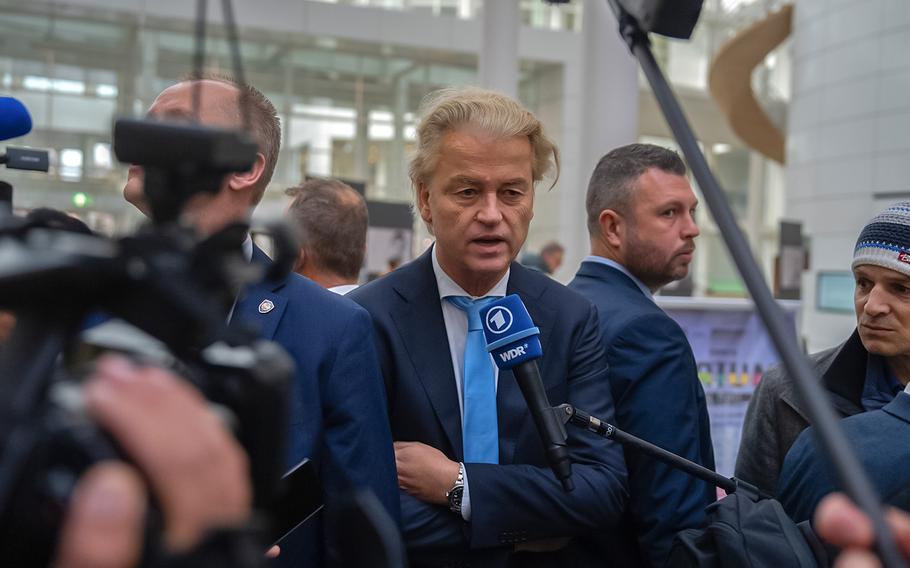
Bodyguards flank Geert Wilders, leader of the Party for Freedom, as he speaks to the media after casting his vote in the Dutch general election on Nov. 22, 2023, in The Hague, Netherlands. (Carl Court/Getty Images/TNS)
(Tribune News Service) — Geert Wilders edged a step closer to securing the majority he needs to form a working government after a center-right rival said it is prepared to lend him its parliamentary support, even while it ruled itself out of taking up seats in his Cabinet.
The People’s Party for Freedom and Democracy, or VVD, will support a center-right Cabinet as “kind of a tolerating partner,” its leader Dilan Yesilgoz-Zegerius said in The Hague on Friday ahead of a meeting with other party heads in parliament.
Wilders’ hopes of forming a working majority now hinge on the decision of the party that came fourth in Wednesday’s election, after the Left alliance which came second ruled itself out of cooperation.
The VVD’s “surprising” move “will make the formation process harder,” Pieter Omtzigt, the head of that fourth-placed party, said on Friday.
Yesilgoz-Zegerius’ qualified offer of support echoes the predicament of Rutte’s first coalition, which ruled via a minority government that rested on external votes from Wilders and ended up lasting only 18 months.
“We will make a center-right Cabinet possible. We will support constructive proposals, so it is a form of tolerance,” Yesilgoz-Zegerius said.
Of her party’s decision to avoid Cabinet seats, she added: “After 13 years, a different role suits us. The voters also said: VVD, skip a round.” The decision honors a pledge she made before the election not to serve under Wilders were he to become prime minister.
If the VVD ends up supporting Wilders’ government with its votes, his surest path to a working majority — and by extension, a claim to the prime ministerial role — would be via the support of Pieter Omtzigt’s New Social Contract, or NSC, which has 20 seats.
“We have a big responsibility, and that is why it is disappointing that VVD takes a kind of a holiday from responsibility,” Wilders said of the VVD’s refusal to serve in his Cabinet.
A “small positive is that she wants to support us from the outside, and we have to see and find out if that is for real,” Wilders said in response to the VVD announcement. On Friday the far-right lawmaker said he had chosen Gom van Strien, a Freedom Party senator, to act as lead negotiator in coalition talks.
Wilders delivered a shock election victory on Wednesday, picking up 37 seats — more than any preelection polls had predicted. The VVD came third with 24 seats, having been the largest party in the last government, when it was led by outgoing Prime Minister Mark Rutte.
Wilders needs to forge alliances with rivals to achieve the 76-seat majority necessary to forming a government. After the exit polls, he had suggested he would be open to center-right coalition including the VVD, as well as newly launched center-right group NSC, and the Farmer Citizens’ Movement.
Left alliance leader Frans Timmermans, who after the election now leads the second-largest bloc in the parliament, ruled out a coalition with Wilders as soon as exit-poll results became clear.
Celeste Perri contributed to this report.
©2023 Bloomberg L.P.
Visit bloomberg.com
Distributed by Tribune Content Agency, LLC.